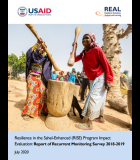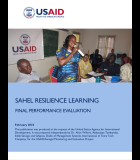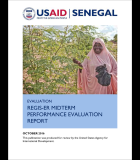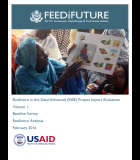Resilience and Economic Growth in the Sahel – Enhanced Resilience (REGIS-ER)
Following repeated large-scale humanitarian emergencies in the Sahel, USAID recognized that continuing to treat these recurrent crises as acute emergencies is extremely costly and does not effectively address their underlying causes. Thus, USAID’s Resilience in the Sahel Enhanced (RISE) initiative realigned existing and new humanitarian and development assistance efforts to strengthen resilience in agro-pastoral and marginal agriculture livelihood zones of the Sahel.
Resilience and Economic Growth in the Sahel - Enhanced Resilience (REGIS-ER) is one of several projects funded under the RISE initiative and managed by USAID's Sahel Regional Office. REGIS-ER is the flagship multi-sectoral resilience project of RISE program that works to end the vicious cycle of crisis and help the Sahel’s most vulnerable populations stay firmly on the path to development. REGIS-ER addresses the root causes of chronic vulnerability by increasing the capacity of households, villages and systems to adapt to and recover from shocks and stresses. REGIS-ER integrates sustainable livelihoods, natural resource management, governance and health and nutrition activities in collaboration with local communities.
The project targets the chronically vulnerable populations in marginal agricultural and agropastoral zones in Niger and Burkina Faso. REGIS-ER’s expected results are tied to the project’s three main objectives: (1) sustainable livelihoods; (2) governance and natural resource management; and (3) health, nutrition and WASH.
Related Project
Sahel Resilience and Learning (SAREL)
Activity Description
Health, nutrition, and WASH-related activities include:
- Improving soil fertility and crop production through conservation farming, farmer-managed natural regeneration, bio-reclamation of degraded land, anti-erosion/water conservation structures and small-scale irrigation
- Increasing access to potable water sources by constructing/rehabilitating boreholes, strengthening community water management and marketing water treatment systems
- Enabling key health and nutrition practices through mother-to-mother groups, husband schools, safe space for adolescent girls and community quality improvement teams
- Mobilizing communities to attain open defecation-free status through community-led total sanitation
Expected Outcomes
- Policy implementation that enables secure access to land, including by the marginalized groups such as agro-pastoralists, women and the most vulnerable
- Improved capacity of community based governance structures, civil society organizations and local government institutions to manage natural resources (e.g., forests, pasture, water points)
- Improved capacity of community-based governance structures and traditional leaders to prevent and resolve conflict through the transparent and consensual management of natural resources (e.g., grazing corridors)
- Effective and community and government co-owned natural resource management plans developed and implemented at the community and landscape and watershed levels that incorporate climate change
- Increased capacity of state and non-state governance institutions to manage climate variability and change
- Consolidation of lessons learned from locally developed and implemented natural resource management plans and use of these lessons inform and (re)shape national-level policy
Actual Outcomes
According to a 2016 midterm evaluation, health, nutrition and WASH beneficiaries in the Sahel agreed that significant changes are happening in their communities in the areas of potable water, behavior change, and best sanitation practices.
In Burkina Faso and Niger, 67 percent strongly agreed that their general well-being has improved. More potable water is now available to the communities without the heavy burden to women of acquiring it; the waterholes are mostly functional. Social communication and behavior change respondents (87 percent) in both countries agreed that behavior change is occurring in their communities. Access to health services has strongly improved, according to 88 percent of respondents in Burkina Faso and Niger. Health practitioners are now better trained, and populations have easier access to health services. Community social dimensions and areas of collective action have also been strengthened.






